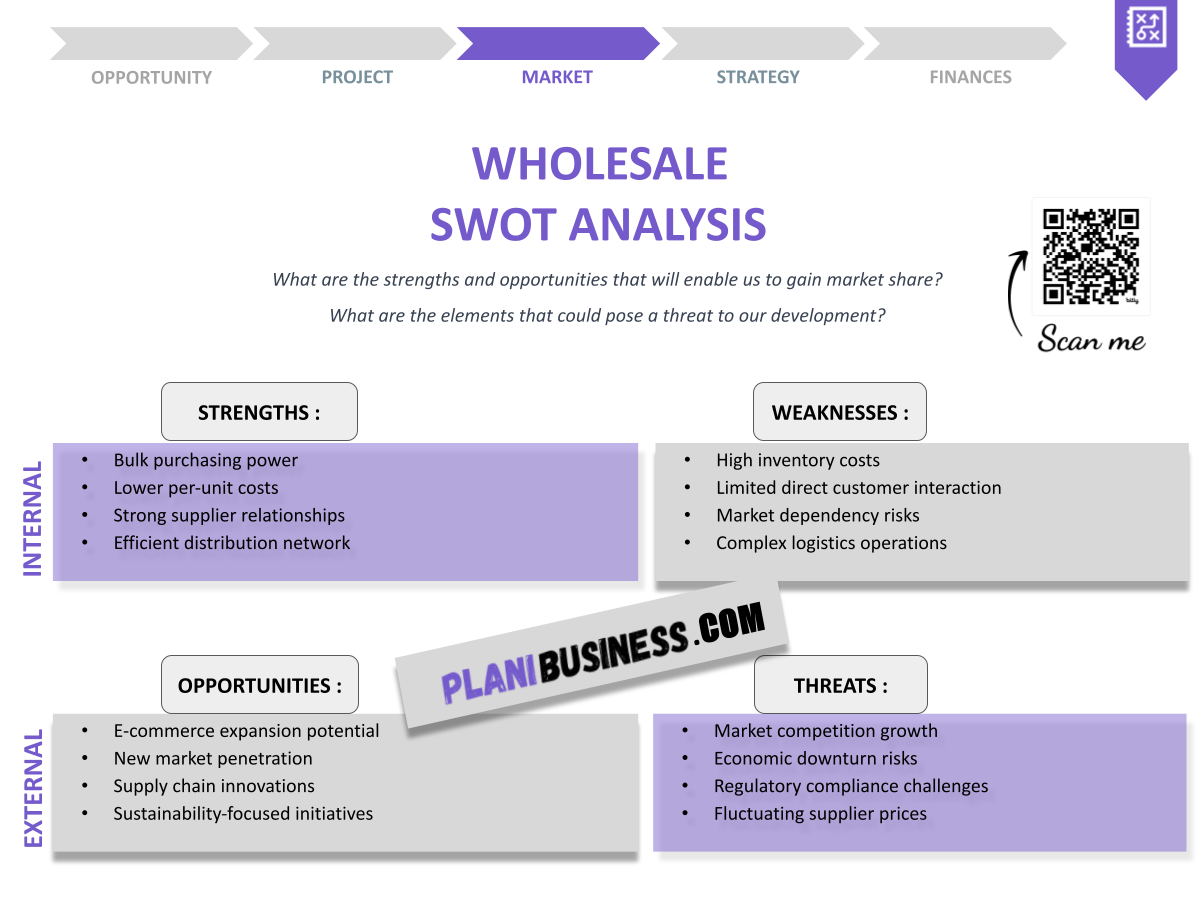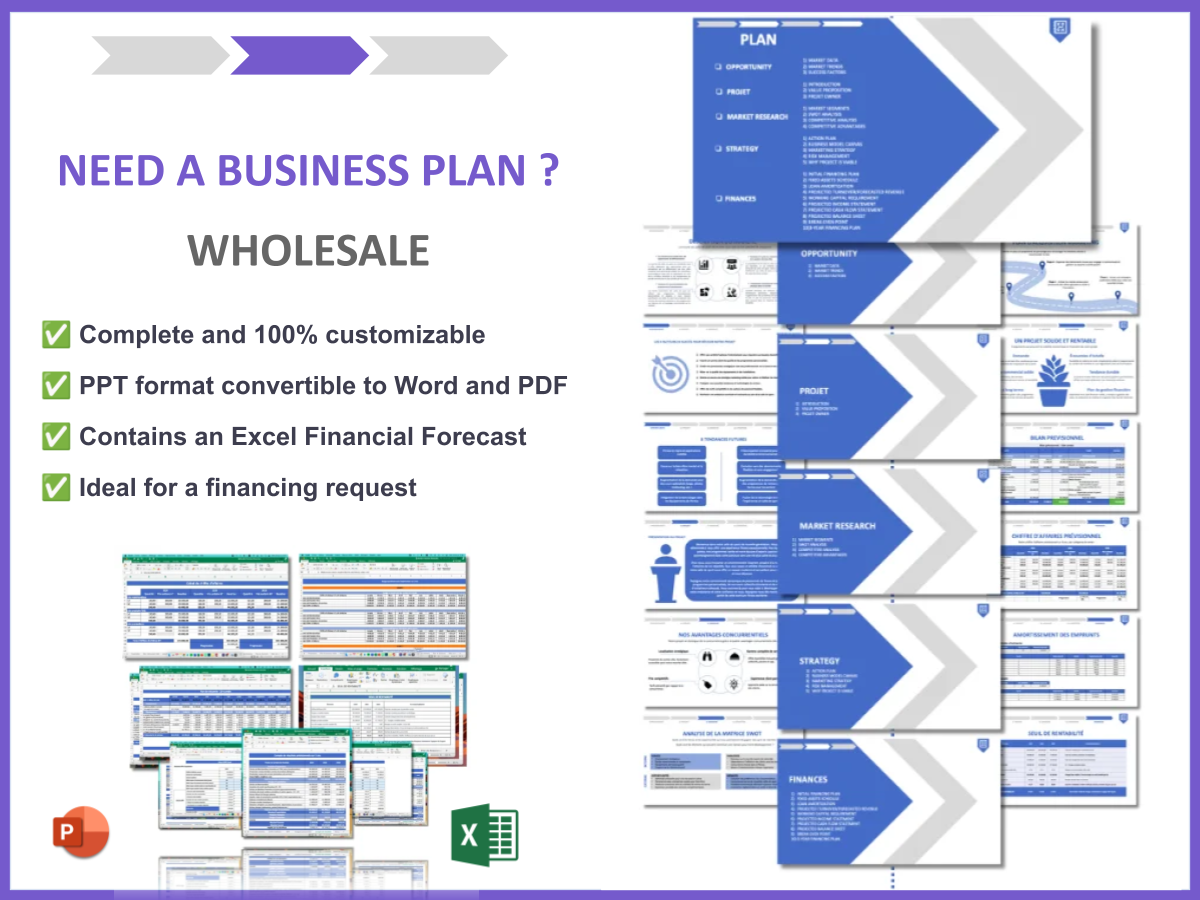Why Should You Have a SWOT Analysis for Wholesale?
Are you looking to enhance your wholesale business strategy? You’re not alone! Many entrepreneurs are turning to SWOT analysis as a crucial tool for assessing their business landscape. Did you know that nearly 70% of businesses that conduct a SWOT analysis see improved strategic planning? In this article, we’ll delve into what a Wholesale SWOT Analysis is and why it’s essential for your success.
A SWOT analysis evaluates the Strengths, Weaknesses, Opportunities, and Threats related to your wholesale business, providing a clear framework for strategic decision-making.
- Understand internal strengths.
- Identify weaknesses that need addressing.
- Spot market opportunities for growth.
- Recognize external threats to your business.
- Enhance strategic planning efforts.
- Improve decision-making processes.
- Foster competitive advantage.
- Align resources with business goals.
- Increase stakeholder confidence.
- Drive continuous improvement.
How Do You Write a SWOT Analysis for Wholesale?
Writing a SWOT analysis for your wholesale business involves a systematic approach to evaluating your current situation. Here’s how to break it down.
Strengths
Your strengths may include established supplier relationships, a robust distribution network, or unique product offerings that set you apart from competitors.
Consider your team’s expertise in logistics and inventory management, which can significantly enhance operational efficiency.
Strong branding and customer loyalty can also be a significant strength, giving you an edge in a crowded marketplace.
Don’t forget about your financial health; solid cash flow can provide you with the agility to respond to market changes.
Weaknesses
Weaknesses might include limited marketing reach or underdeveloped online presence, making it hard to attract new customers.
Inventory management issues can lead to excess stock or stockouts, affecting your profitability.
Lack of diversification in your product line can make you vulnerable to market fluctuations.
High operational costs may also be a significant weakness that needs addressing.
Opportunities
Opportunities could include emerging market trends or technological advancements that streamline operations.
Expanding your online sales channels may open new revenue streams.
Collaborating with complementary businesses can enhance your product offerings and reach.
Government incentives for wholesale businesses can also be a chance to reduce costs and improve margins.
Threats
Threats may come from increasing competition in the wholesale market, which can squeeze your margins.
Economic downturns can affect demand, making it essential to monitor market conditions.
Changes in regulations can impact your operational costs and compliance requirements.
Supply chain disruptions, as seen during the pandemic, can threaten your ability to deliver products on time.
SWOT Example N°1 for Wholesale Clothing Business
Here’s an example of a SWOT analysis for a fictional wholesale clothing business.
| SWOT | Analysis |
|---|---|
| Strengths | Established brand reputation, strong supplier relationships |
| Weaknesses | Limited online presence, high operational costs |
| Opportunities | Growing demand for sustainable fashion, e-commerce expansion |
| Threats | Increased competition, fluctuating material costs |
- Strong brand reputation
- Limited online presence
- Growing demand for sustainability
- Increased competition
- This example highlights the importance of recognizing both internal and external factors. - The business's strengths provide a solid foundation, but its weaknesses must be addressed to capitalize on opportunities.
SWOT Example N°2 for Wholesale Electronics Distributor
An analysis for a wholesale electronics distributor.
| SWOT | Analysis |
|---|---|
| Strengths | Diverse product range, strong logistics network |
| Weaknesses | High dependency on a few suppliers |
| Opportunities | Rise in smart home devices, potential international markets |
| Threats | Rapid technological changes, economic fluctuations |
- Diverse product range
- Dependency on suppliers
- Smart home market growth
- Economic fluctuations
- This SWOT analysis emphasizes the need for diversification in supply sources to mitigate risks.
SWOT Example N°3 for Wholesale Food Distributor
An example for a wholesale food distributor.
| SWOT | Analysis |
|---|---|
| Strengths | Strong local supplier relationships, diverse product offerings |
| Weaknesses | Limited brand recognition |
| Opportunities | Growing demand for organic products |
| Threats | Stringent food safety regulations |
- Local supplier relationships
- Limited brand recognition
- Organic product demand
- Food safety regulations
- This example shows how local strengths can be leveraged to enhance market presence.
SWOT Example N°4 for Wholesale Furniture Supplier
An analysis for a wholesale furniture supplier.
| SWOT | Analysis |
|---|---|
| Strengths | High-quality products, strong customer service |
| Weaknesses | Limited marketing budget |
| Opportunities | Growth in online furniture sales |
| Threats | Economic downturn affecting consumer spending |
- High-quality products
- Limited marketing budget
- Online sales growth
- Economic downturns
- The analysis highlights the need for strategic marketing investments to tap into online growth opportunities.
SWOT Example N°5 for Wholesale Automotive Parts Distributor
An analysis for a wholesale automotive parts distributor.
| SWOT | Analysis |
|---|---|
| Strengths | Established customer base, efficient inventory management |
| Weaknesses | Limited geographic reach |
| Opportunities | Increase in vehicle sales |
| Threats | Rising competition |
- Established customer base
- Geographic limitations
- Vehicle sales increase
- Rising competition
- This SWOT points out the need to expand geographically to capture more market share.
SWOT Example N°6 for Wholesale Health and Beauty Products Distributor
An analysis for a wholesale health and beauty products distributor.
| SWOT | Analysis |
|---|---|
| Strengths | Wide product variety, strong supplier network |
| Weaknesses | High return rates |
| Opportunities | Growing demand for natural products |
| Threats | Price wars in the market |
- Product variety
- High return rates
- Demand for natural products
- Price wars
- This analysis underscores the importance of quality control to reduce return rates and improve customer satisfaction.
SWOT Example N°7 for Wholesale Stationery Supplier
An analysis for a wholesale stationery supplier.
| SWOT | Analysis |
|---|---|
| Strengths | Established relationships with schools, bulk purchasing options |
| Weaknesses | Seasonal sales fluctuations |
| Opportunities | E-commerce growth |
| Threats | Digital alternatives |
- School relationships
- Seasonal fluctuations
- E-commerce opportunities
- Digital competition
- The analysis reveals how the shift to e-commerce can provide stability during seasonal downturns.
SWOT Example N°8 for Wholesale Pet Supply Distributor
An analysis for a wholesale pet supply distributor.
| SWOT | Analysis |
|---|---|
| Strengths | Diverse product range, strong customer loyalty |
| Weaknesses | Limited advertising budget |
| Opportunities | Growth in pet ownership |
| Threats | Market saturation |
- Product range
- Advertising budget
- Pet ownership growth
- Market saturation
- This analysis highlights the need for creative marketing strategies to overcome budget constraints.
SWOT Example N°9 for Wholesale Book Distributor
An analysis for a wholesale book distributor.
| SWOT | Analysis |
|---|---|
| Strengths | Strong relationships with publishers, diverse catalog |
| Weaknesses | Declining print sales |
| Opportunities | Rise in audiobooks and digital content |
| Threats | Digital competition from online retailers |
- Publisher relationships
- Print sales decline
- Audiobook rise
- Digital competition
- This example shows how diversifying product offerings can mitigate the impact of declining print sales.
SWOT Example N°10 for Wholesale Home Improvement Supplier
An analysis for a wholesale home improvement supplier.
| SWOT | Analysis |
|---|---|
| Strengths | Comprehensive product range, knowledgeable staff |
| Weaknesses | Dependency on seasonal sales |
| Opportunities | Home renovation trends |
| Threats | Economic downturns affecting consumer spending |
- Product range
- Seasonal dependency
- Renovation trends
- Economic downturns
- This SWOT emphasizes the need for strategies to maintain steady sales throughout the year.
Conclusion
In summary, a Wholesale SWOT Analysis can significantly enhance your business strategy. By understanding your strengths, weaknesses, opportunities, and threats, you can make informed decisions that drive growth and sustainability in your wholesale business. To take your business to the next level, consider using a comprehensive business plan template for Wholesale that provides a structured approach to planning and execution.
For more insights, check out our articles on How to Create a Wholesale Business? and How to Start a Wholesale Marketing Plan? With Example. These resources will guide you in navigating the complexities of the wholesale industry and help you develop effective strategies.
Frequently Asked Questions
1. What is a SWOT analysis in wholesale?
A SWOT analysis in wholesale is a method used to assess the Strengths, Weaknesses, Opportunities, and Threats related to a wholesale business, helping in strategic planning.
2. Why is conducting a SWOT analysis beneficial?
Conducting a SWOT analysis helps businesses pinpoint their internal and external factors that can influence success, guiding effective strategic planning.
3. How frequently should a SWOT analysis be performed?
It’s recommended to perform a SWOT analysis at least once a year or whenever there are significant changes in your business environment or market conditions.
4. Can small wholesale businesses utilize SWOT analysis?
Absolutely! A SWOT analysis is beneficial for businesses of all sizes, providing valuable insights for growth and business development.
5. What common weaknesses should I look for in my SWOT analysis?
Common weaknesses include limited marketing reach, high operational costs, and a dependency on a few suppliers.
6. How can I identify opportunities in my SWOT analysis?
Look for emerging market trends, shifts in consumer behavior, and technological advancements that could benefit your wholesale business.
7. What threats should I consider in my SWOT analysis?
Consider threats from increasing competition, economic shifts, regulatory changes, and potential supply chain disruptions.
8. Is SWOT analysis applicable to personal development?
Yes! You can apply a SWOT analysis to personal development to evaluate your own strengths and weaknesses, and identify areas for growth.
9. What is the best way to present a SWOT analysis?
A clear and organized table format is often the most effective way to present a SWOT analysis, making it easy for stakeholders to understand.
10. Where can I find examples of SWOT analysis?
Many business resources, including online articles and books, provide a variety of examples of SWOT analysis across different industries.







